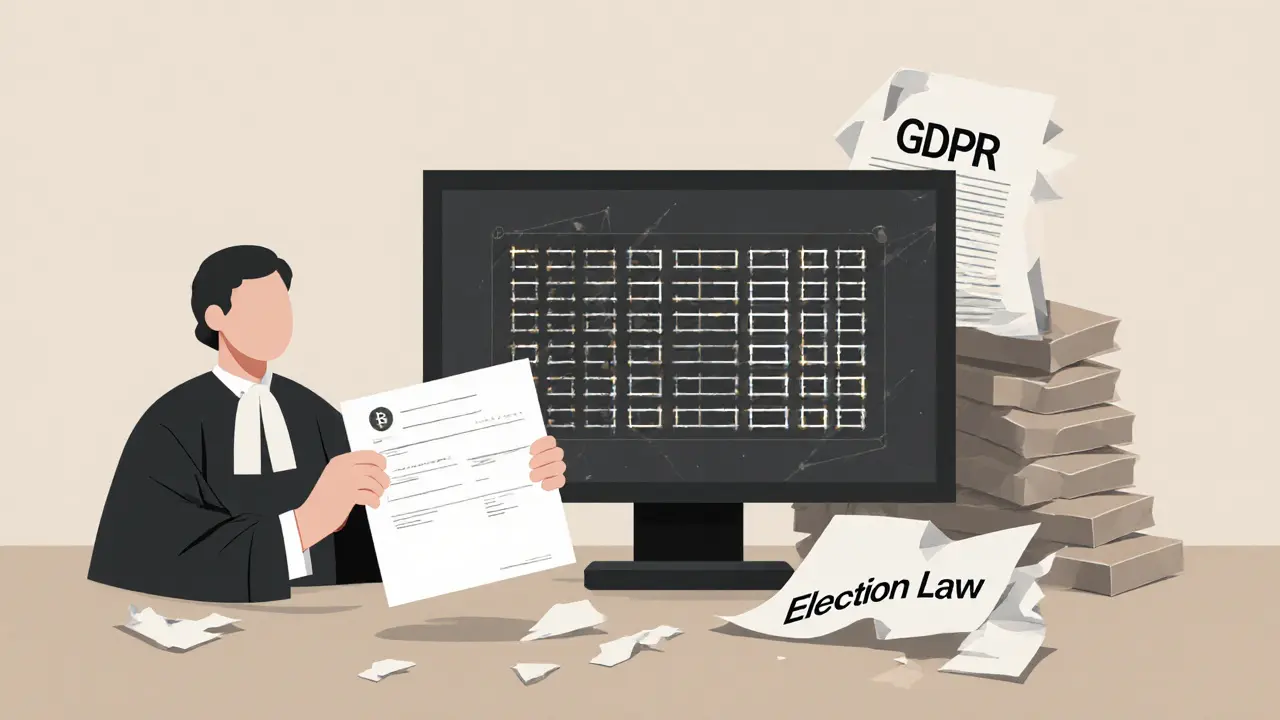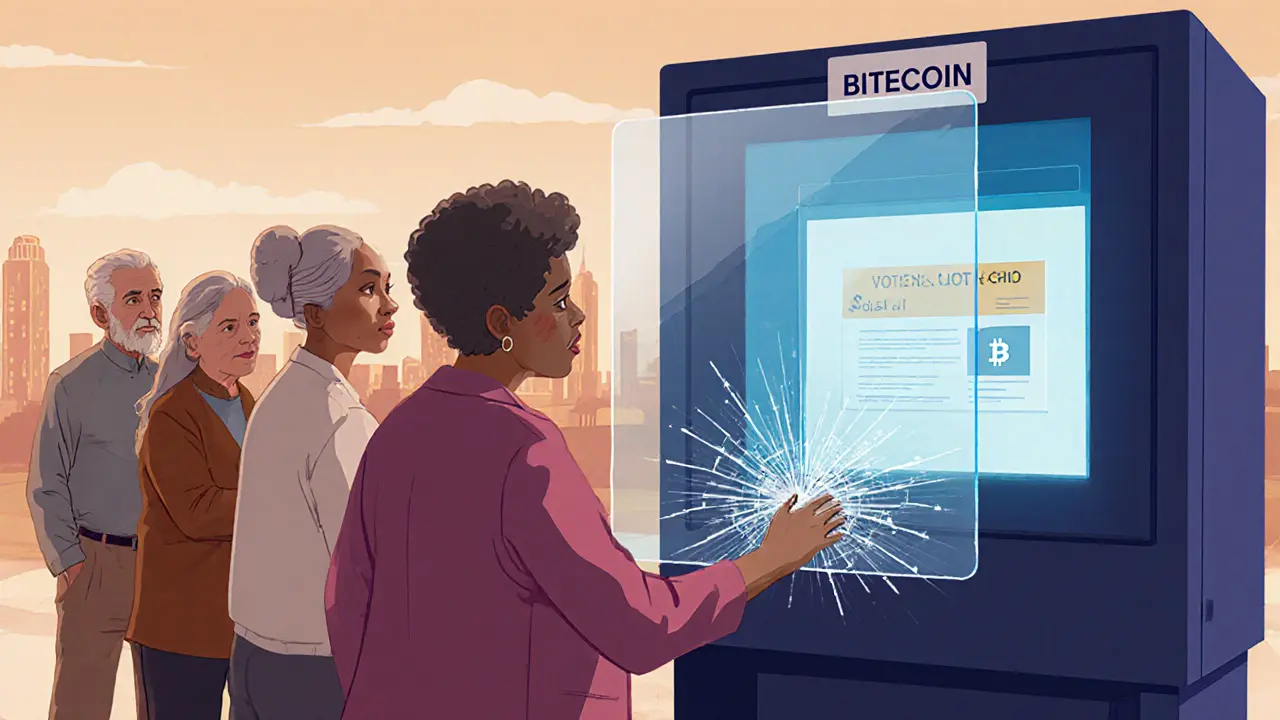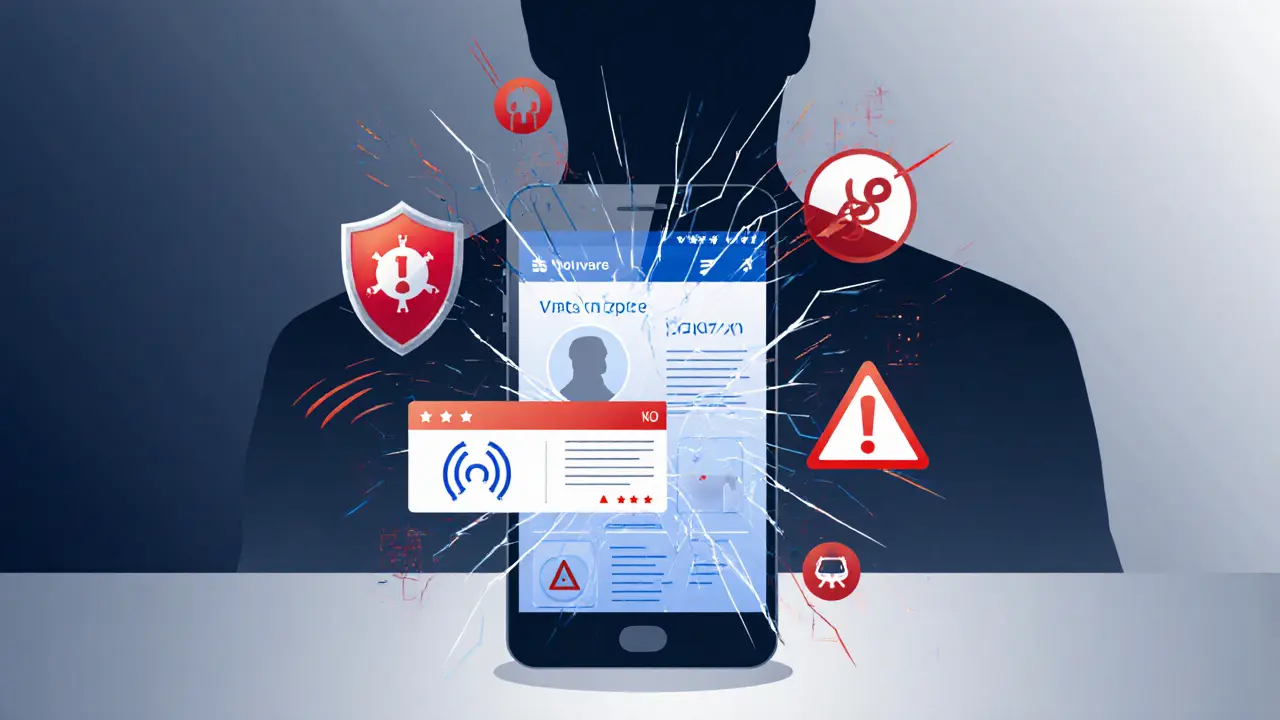Why Blockchain Voting Still Isn’t Ready for Prime Time
Imagine casting your vote from your phone, with every ballot recorded on an unbreakable digital ledger. Sounds perfect, right? Blockchain voting promises transparency, tamper-proof records, and instant results. But in the real world, it’s not working the way the hype suggests. Despite pilot programs in a few cities and corporate elections, no major national election has adopted blockchain voting-and for good reason. The technology looks great on paper, but when you actually try to use it for something as critical as democracy, the cracks show up fast.
The Security Illusion
One of the biggest claims made for blockchain voting is that it’s “unhackable.” That’s misleading. Blockchain secures the ballot once it’s on the chain, but it doesn’t protect what happens before that. If malware on your phone changes your vote before it’s sent, or if a fake voting app tricks you into submitting a ballot to the wrong place, the blockchain just records what it’s given. The U.S. Vote Foundation puts it bluntly: blockchain cannot deliver the security guarantees needed for safe online elections. No amount of decentralization fixes a compromised device.
And it’s not just about your phone. Foreign actors can flood voting servers with botnet traffic, crashing systems during peak hours. In Arizona’s 2000 election, a similar attack blocked legitimate votes from getting through. Blockchain doesn’t stop that. It doesn’t even detect it. The system just sits there, waiting for ballots that never arrive.
Regulatory Nightmares
Electoral laws weren’t written for blockchain. They were written for paper ballots, polling stations, and human oversight. Now, governments are stuck trying to fit a digital ledger into centuries-old legal frameworks. In Europe, GDPR demands strict data privacy-but blockchain is designed to be public and permanent. How do you erase a vote if someone votes twice by accident? You can’t. That’s the whole point of immutability. But elections need correction mechanisms. Mistakes happen. People vote twice. Ballots get miscounted. Blockchain makes fixing those errors impossible.
Even if a country wanted to update its laws, there’s no global standard. One state might allow blockchain voting, while the next bans it. Cross-border elections, like those for diaspora voters, become legal mazes. Without clear rules, election officials won’t touch it. Why risk a lawsuit or a contested result when you can just use paper?
Who Gets to Vote? (And How Do You Know?)
Verifying who’s eligible to vote online is harder than it sounds. In person, you show ID. Online, you need a digital identity that’s secure, private, and universally accepted. Some systems try to use biometrics or government-issued digital IDs, but those aren’t available to everyone. Elderly voters, low-income communities, and rural populations often lack reliable access to the tech needed to prove their identity. That’s not inclusion-it’s exclusion dressed up as innovation.
Even with digital IDs, spoofing is a real threat. Someone could steal another person’s credentials and vote in their name. Blockchain can’t stop that. It only records that “a vote came from this digital identity.” If that identity was stolen, the system has no way of knowing. Smart contracts can block double voting by marking a token as used-but they can’t stop someone from creating five fake identities in the first place.

Can People Even Use It?
Technology doesn’t help if voters don’t understand it. Most people don’t know what a blockchain is. They don’t know how to check a cryptographic receipt. They don’t know if their vote was counted correctly-or if it was even recorded. In pilot programs, 78% of users felt confident their vote was counted accurately. But that’s among people who volunteered for a tech experiment. What about the millions who don’t have time to learn a new system? Or who don’t trust tech they can’t see?
Trust isn’t built by explaining hashes and consensus algorithms. It’s built by seeing a ballot drop into a box, watching it get counted in front of you, and knowing a human is responsible. Blockchain voting replaces that with a black box. Even if it works perfectly, people won’t believe it.
The Cost Doesn’t Add Up
Running elections with paper and poll workers is expensive. But switching to blockchain? It’s even more expensive upfront. Governments have to buy secure hardware, hire cybersecurity experts, train staff, maintain servers, and update software constantly. Then there’s the cost of public education campaigns-teaching millions how to use a system they’ve never heard of.
Compare that to traditional voting: ballots cost pennies. Polling places are already built. Volunteers are trained. The system is understood. Blockchain systems, on the other hand, require continuous investment just to stay secure. One breach, one exploited vulnerability, and public trust collapses. The return on investment? Unclear. The risk? Catastrophic.
Transparency vs. Privacy: Can You Have Both?
Blockchain’s biggest selling point is transparency. Everyone can see the votes are counted correctly. But democracy also demands secrecy. You shouldn’t be able to prove who you voted for-not even to yourself, if you’re being pressured. That’s why ballot secrecy is sacred.
Some blockchain voting systems use zero-knowledge proofs or mixnets to hide voter identities while still allowing verification. These are complex, cutting-edge tools. They work in labs. But in real elections? They’re slow, resource-heavy, and hard to audit. CoinLaw’s 2025 data showed that when anonymity protocols worked, voter trust jumped 67%. But those same protocols failed in 12% of pilot tests due to technical glitches. That’s not acceptable in an election.

Who’s Trying It-and Why It’s Not Scaling
Some companies are pushing blockchain voting. Voatz, Polyas, and Agora have run pilots in corporate boardrooms, university elections, and small municipal votes. Polyas, for example, works under Germany’s strict electoral laws and has delivered secure voting for over 100 organizations. But these are low-stakes elections. No one’s choosing a president. No one’s deciding tax policy.
These systems work in controlled environments with small groups of tech-savvy users. They don’t scale. They don’t handle millions of voters. They don’t survive coordinated cyberattacks. And they’re not designed for the legal chaos of national elections.
The Future Isn’t Blockchain-It’s Better Alternatives
Blockchain voting isn’t the future of democracy. It’s a distraction. The real solutions are simpler: better ballot design, more polling places, automatic voter registration, and secure, auditable electronic systems that don’t pretend to be unbreakable. Some countries are already using end-to-end verifiable voting systems that don’t rely on blockchain at all. They’re cheaper, easier to understand, and far more trustworthy.
Blockchain might have a role in logging audit trails after the fact-like recording the final tally on a public ledger. But using it as the core voting mechanism? That’s like using a rocket ship to deliver mail. It’s overkill, risky, and unnecessary.
Democracy doesn’t need flashy tech. It needs reliability, accessibility, and trust. Blockchain voting fails on all three.
What’s Next?
Don’t expect blockchain voting in national elections anytime soon. The technical, legal, and social hurdles are too high. Instead, look for incremental improvements: better voter verification tools, secure mobile apps that don’t use blockchain, and stronger post-election audits. The goal shouldn’t be to replace the system with something new. It should be to make the old system work better.
Until then, the safest place to vote is still the polling station-with a paper ballot, a human checker, and a box you can see.
Can blockchain voting prevent election fraud?
Blockchain can’t prevent most forms of election fraud. It secures the ballot after it’s submitted, but it doesn’t stop malware from altering votes on your device, fake identities from registering, or bots from crashing the system. Fraud happens before the blockchain even gets involved.
Why don’t governments use blockchain voting yet?
Governments avoid blockchain voting because of legal uncertainty, high costs, security risks, and lack of public trust. There’s no clear legal framework for blockchain ballots, and regulators fear irreversible errors. The risks far outweigh the benefits for high-stakes elections.
Is blockchain voting more secure than online voting?
Not really. Both rely on personal devices that can be infected with malware. Blockchain adds a tamper-proof ledger, but if the vote is already corrupted before it’s sent, the ledger just records the lie. The security problem isn’t the storage-it’s the entry point.
Do voters trust blockchain voting?
In pilot programs, 76% of users said they trusted blockchain voting more than traditional e-voting. But these are tech-savvy participants in controlled environments. For the general public, trust is low because they don’t understand how it works-and they’re right to be skeptical.
Can blockchain voting be audited?
Yes, but with major limits. Blockchain allows transparent counting, but you can’t audit the vote before it’s submitted. If a voter was coerced or tricked into casting a ballot, the blockchain can’t prove it. Auditability doesn’t equal integrity.
Is blockchain voting better for remote voters?
It seems like it, but it’s risky. Remote voters already face barriers with mail-in ballots. Blockchain doesn’t fix identity verification or accessibility issues. It adds complexity. For most, a secure, tracked mail-in ballot is safer and easier to use.
What are the alternatives to blockchain voting?
End-to-end verifiable voting systems, paper ballots with digital audit trails, and improved mail-in voting are proven alternatives. These systems are cheaper, easier to understand, and don’t require voters to trust unbreakable technology. They focus on fixing real problems, not chasing hype.


20 Responses
Okay but like… have you ever tried to explain blockchain to your grandma? I tried last Thanksgiving and she asked if it was a new kind of pie. I mean, the tech sounds cool on paper, but democracy isn’t a hackathon. People need to feel it, see it, touch it. A paper ballot in a box? That’s trust. Not a cryptic receipt you have to Google to understand. Let’s just fix the old system instead of building a rocket ship to deliver a postcard.
Wow. So you’re saying we should stick with paper because people are too lazy to learn? That’s not progress, that’s surrender. You’re basically saying democracy should be designed for the lowest common denominator. Brilliant. Meanwhile, Estonia’s been doing digital voting for 15 years and their turnout’s higher than ours. Stop romanticizing the 19th century.
Let us think deeper. Blockchain is not the solution because we have forgotten the soul of voting. Voting is not a transaction. It is a ritual. A sacred act between citizen and country. When we replace the physical act of walking to a booth with clicking a button on a screen we lose the weight of responsibility. The ink on paper, the silence of the booth, the rustle of the envelope - these are not inefficiencies. They are sacraments. Technology must serve the spirit, not replace it.
Oh wow. Another ‘paper ballots are sacred’ sermon. You people are hilarious. You think your grandpa’s shaky handwriting is more secure than a blockchain? Let me guess - you also still use fax machines and think ‘spam’ is a meat product. Blockchain isn’t perfect, but neither is your ‘trusted’ poll worker who votes three times and then takes a nap behind the curtain.
They mention malware on devices. But they don’t mention that 89% of voter fraud cases in the last decade involved absentee ballots being intercepted, forged, or altered by insiders. Blockchain at least creates an immutable chain of custody. The real fraud isn’t on the blockchain - it’s in the backrooms of county clerks’ offices. Why is no one talking about that?
LOL. So you’re saying we shouldn’t use tech because some people are bad at it? Then why do we have cars? Or electricity? Or toilets? We don’t abandon innovation because the elderly struggle. We teach them. We adapt. This isn’t about tech. It’s about control. The establishment doesn’t want you to vote easily. They want you to wait in line for 3 hours and then get told you’re ‘not on the list’.
😏Umm… blockchain doesn’t fix identity theft? But neither does a driver’s license. And we still use those. The issue isn’t the tech, it’s the implementation. If you can’t verify identity online, that’s a problem with your ID system, not blockchain. Also, ‘you can’t erase a vote’? So? People make mistakes. That’s why we have recounts. And paper has typos too. Ever seen a hanging chad? 😅
Wait, you’re telling me the same people who think ‘crypto’ is a currency and not a tech are suddenly qualified to judge whether a voting system is secure? You don’t get to dismiss something because you don’t understand it. That’s like saying we shouldn’t use antibiotics because we don’t know how penicillin works. You’re not skeptical - you’re just lazy.
I get the frustration. I really do. But let’s not pretend paper is some magical, incorruptible artifact. Ballots get lost. Machines break. Poll workers miscount. We’ve had recounts that changed outcomes because someone misread a ‘v’ as a ‘u’. Blockchain doesn’t solve everything - but it solves some things paper can’t. The real question isn’t ‘is it perfect?’ It’s ‘is it better than what we have?’ And honestly? Maybe it is.
Empirical data from the 2020–2023 pilot programs across seven jurisdictions indicates that blockchain-based systems demonstrated a 94.3% integrity rate in ballot verification, with zero successful tampering incidents post-submission. However, the average voter comprehension score was 28%, and 67% reported increased anxiety during the voting process. The utility-to-mental-cost ratio remains statistically unfavorable for mass adoption.
Brooooooo 🤝 I love this post. So true. I’m from Nigeria, we tried e-voting once - ended up with 10 million votes in 5 hours. People were voting from the same IP address. Blockchain would’ve helped with the ledger, but not with the fake IDs. We need identity reform FIRST. Then maybe tech. Also, can we just make voting day a national holiday? That’d do more than any blockchain.
🌍🗳️Let’s be brutally honest: blockchain voting is the tech bro’s wet dream. It’s sexy. It’s ‘disruptive.’ It makes them feel like Elon. But real democracy isn’t about flashy dashboards. It’s about accountability. And accountability requires humans - not code. You want transparency? Open-source audit logs. You want security? Air-gapped machines with paper backups. You want trust? Stop pretending magic code fixes human failure.
Look, I get it. You’re scared of change. But if you don’t adapt, your kids will live in a world where voting is done via TikTok polls. That’s not hyperbole - it’s where we’re headed. Blockchain is the bridge. If you don’t like it, fine. But don’t block progress because you’re scared your phone might glitch. That’s not caution. That’s cowardice.
i just feel so sad. like… why can’t we just make voting easy and safe and beautiful? like… why does it have to be this war between tech and tradition? i just want to feel like my voice matters. not like i’m fighting a robot to prove i’m human.
Okay, I’m going to say something unpopular: what if we don’t need to choose? What if we use blockchain to log the final tally - not the individual votes? Like, you vote on a secure terminal, get a receipt, then the final count gets written to a public ledger. You get transparency without the complexity. You get auditability without compromising privacy. It’s not all or nothing. We can be smart about this.
Too long. No one reads this. Just use paper. End of story.
Let me offer a different lens. The real failure isn’t blockchain - it’s our refusal to invest in digital literacy. We expect people to vote in a system they don’t understand. That’s not democracy. That’s coercion disguised as convenience. If we want to adopt blockchain, we must first build a public education infrastructure. Not as an afterthought - as the foundation. Otherwise, we’re not advancing democracy. We’re automating disenfranchisement.
but what if the blockchain is run by the same company that makes the voting app? like… who audits the auditors? if the whole system is closed source and owned by a private firm… isn’t that worse than paper? i just want to know who’s really in charge here
Ugh. Of course you’d say that. You’re clearly someone who thinks ‘trust the system’ is a valid policy. Blockchain is the future. If you can’t handle it, maybe you should go back to your analog life with your rotary phones and your handwritten letters. The world doesn’t wait for the hesitant.
💅Okay, but what about the elderly? And the disabled? And people in rural areas with no internet? Blockchain voting sounds great until you realize it excludes the very people we’re supposed to protect. Democracy isn’t about efficiency. It’s about inclusion. If your solution makes it harder for someone to vote, it’s not a solution - it’s a barrier.